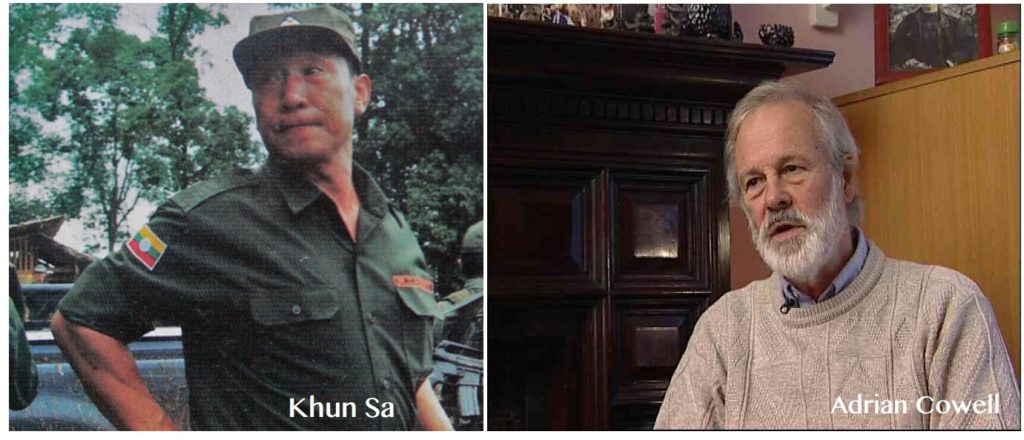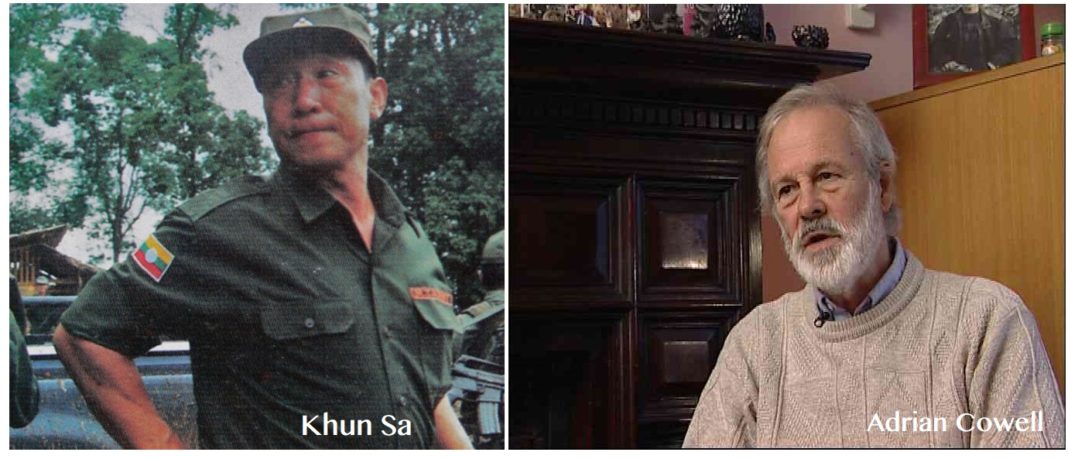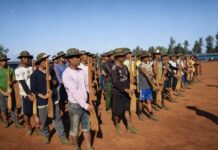Presentation at Opening the Archives: Southeast Asia Collections at the University of Washington Collections-The Adrian Cowell Collection on Shan State Drug and ethnic Wars, 26 February 2021.
What I’m going to present may be in conflict with what most people have read and heard about Khun Sa and drugs. Let me assure them that I’m speaking from my old diaries which were not made up.

I had not met Adrian, when he was doing “The Unknown War” with Chris Menges of “The Killing Fields” fame, in 1964-65 and “The Opium Warlords” in 1972-73, which features the Shan State Army (SSA) proposal to terminate the opium trade in exchange for American assistance “to persuade the government of Burma to return to the legal constitution” of 1947. Or even in 1977, when he accompanied Mr Joseph Nellis, chief counsel to Congressman Mr Lester Wolff, Chairman of Foreign Relations Committee, to meet Sao Khun Sa to receive his 6 year opium eradication plan.
He disappeared from the Shan scene after their 1973 and 1977 proposals were turned down by Washington in favor of the military government’s “Drugs equal rebels” rationale. His return in 1993 coincided with the coming to the White House of Bill Clinton (1993-2001).
My diary on 25 November 1993 records what he told Khun Sa:
President Clinton is a consensus leader, shunning confrontation as best he can. So when it comes to drugs, US State Department just let people like me to bark and bite the regime. He believes the end of the drug trade will only come when there is an elected government.
Note:
What Adrian said was in line with Mr Clinton’s speech in Bangkok later in 1996, as reported by The Times of India: The refusal of Burma’s rulers to move toward democracy and the regime’s involvement in narcotics “are really two sides of the same coin, for both represent the absence of the rule of law.”
Khun Sa’s response:
The end of drugs will come only with the departure of the Burmese military forces from Shan State.
To this, Adrian said:
I agree. For this, you will need envoys to talk to the President’s people. Clinton wants change in the drug policy. But at the same time he doesn’t want problems within the administration either. Therefore, my request is that there be no leakage of my conversation to the media.
Khun Sa then asked:
What about the (1990) indictment on me?
To which Adrian’s reply was:
As you know, General, this is all politics. What we need to do is to resolve the political issues first. You won’t find the indictment a problem afterward.
It was not just because of the drug issue he had to come back, he explained just before the end of the meeting. “While Chris and I were filming ‘The Opium Warlords,’ we were one time traveling with Sao Hso Ten (one of the SSA top leaders) in the Nam Pang valley. There was a festival in the village nearby and two of his fighters, one 16 and the other 18, sneaked off to enjoy themselves. They were caught by a 400 men Burmese column and interrogated, asking them about our whereabouts. They even shelled the monastery we were thought to be putting up. And finding no one the two were beheaded. We were really moved by these young men sacrificing their lives for us, and since then have vowed to help the Shans in any way we can.”
The result was the 8 day visit to Homong Headquarters of Khun Sa by Mr Peter Bourne, 23-30 April 1994. (Note: Mr Bourne’s journal “Report on visit to Shan State” says it’s May. But my diary states otherwise.)
On 25 April, a 5 point commitment was given by Khun Sa:
- The overthrow of SLORC (State Law and Order Restoration Council) and the establishment of democracy in Burma
- The freeing of Aung San Suu Kyi
- Promotion of peace and security in Southeast Asia
- The ending of opium trade in Shan State
- The withdrawal of Burmese troops from Shan State (ie. Shan State independence)
His visit was followed by Khun Sa’s attacks on Burmese strongholds and the march to the north. Plus my visit to the US in the following year.
However an about turn took place after the counter offensive by the Burmese military (suspected to have been tipped off by China) which dispersed the Shan forces marching to the north and led to a mutiny that shook the whole movement. This spelt the last straw for Khun Sa, who had not only already lost the drug control to the Wa but also Taiwan’s covert support. Surrounded by odds on all sides, he finally decided to surrender, which he did in January 1996.
And Adrian, for the third and last time, lost his gamble again.
Watching his ‘Opium Wars’ and his concluding remarks, I felt that he was trying his best to be objective. But I also had a feeling that his heart was broken.
Thank you.












Leave a Comments